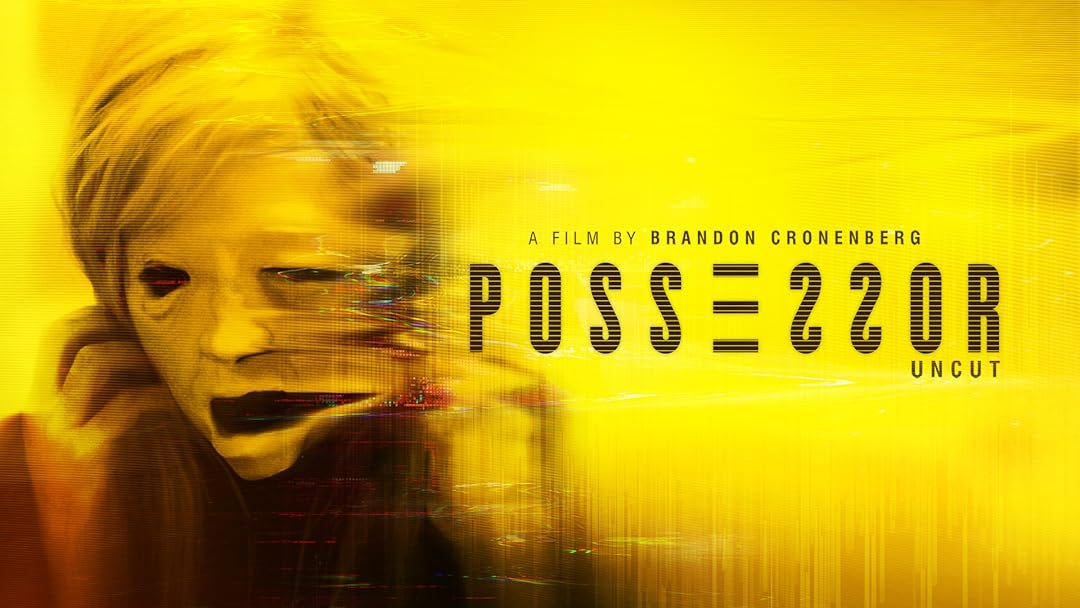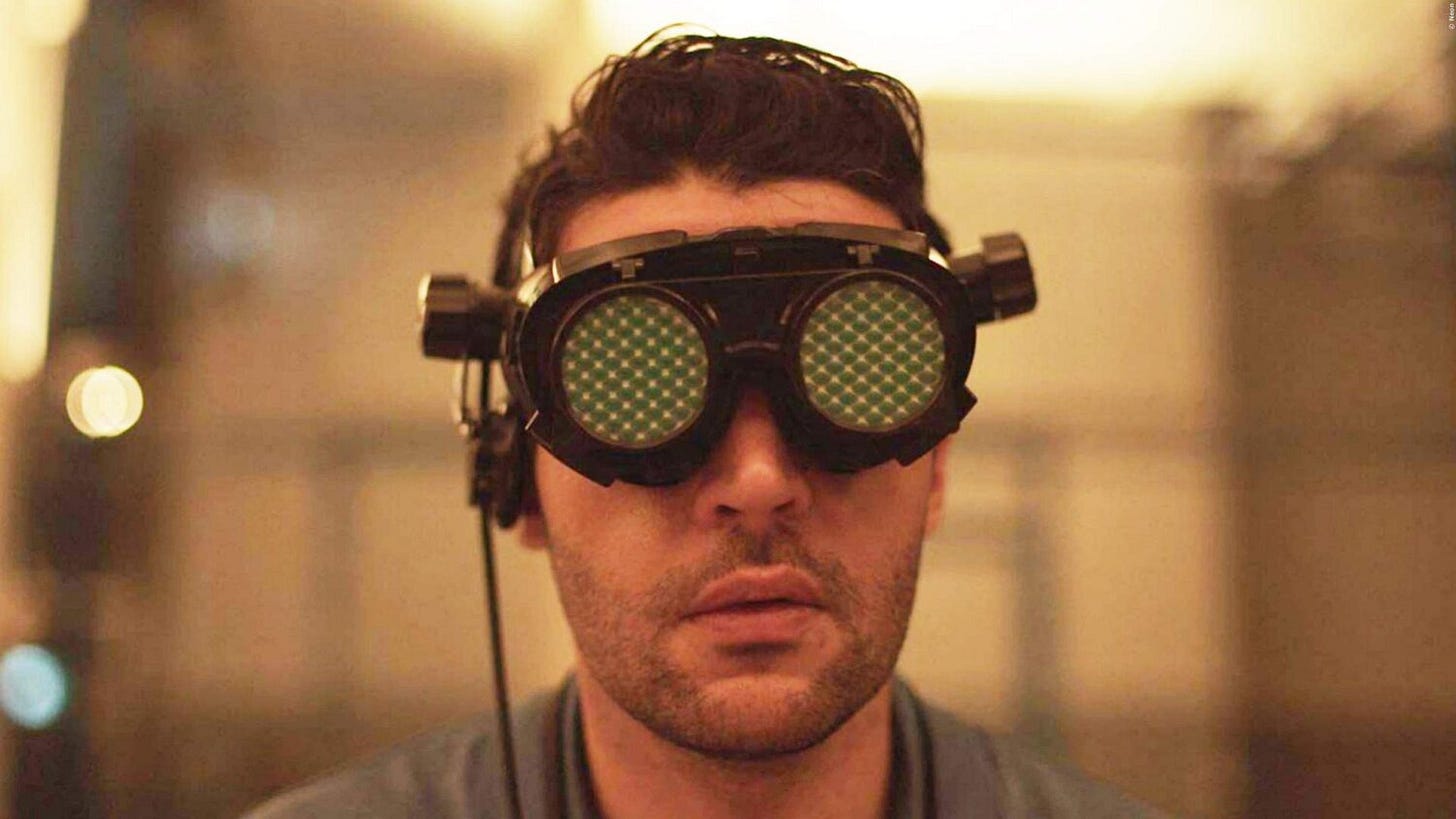Directed by Brandon Cronenberg
Canada, 2020
The son shall not bear the iniquity of the father, neither shall the father bear the iniquity of the son. Ezekiel 18:19 – 23
What on earth is this Biblical reference doing in a ReidsonFilm review? Well, apart from the eschatological hints in Possessor, written and directed by Brandon Cronenberg, this week’s film brought to mind a line from our review of his father’s 2022 psychological thriller:
You get the feeling with Crimes of the Future that Cronenberg started out with a beguiling concept but struggled to take it any further.
Frustratingly with Possessor there are some interesting ideas at play: questions of identity, selfhood, and the present-day dangers of corporate data mining. There is a compelling premise here perhaps, but as a screenwriter Brandon Cronenberg has limitations. And rather than trying to fill the many plot holes or add a little complexity, he opts, in a film already riddled with clichés, for that well-worn cliché of style over substance.
The Possessor in question is a superstar assassin, with a name that could only ever befit a hired gun, Tasya Vos. We are in an alternate Toronto of 2008 and Vos works under the direction of Girda (Jennifer Jason Leigh). A former assassin herself, she has withdrawn from work on the shop-floor and continually massaging her neck and shoulders, shows signs of the toll the work takes. Because what the job involves is Vos remotely implanting her own thoughts into the mind of an unwitting host and directing them to do the dirty on the target. On completion she forces the host to kill themselves, allowing herself to be ‘pulled out’, back to a kind of normality.
After watching an intriguing entrée play out in a glitzy uptown restaurant with the blood-splattering illuminated by neon lighting, we can see that the toll the work takes is not only physical but psychological. Vos is having trouble with the suicide aspect of the job, and after being plugged out of the mind-machine she is left with persistent, debilitating body cramps. In a process that’s either a homage, or a steal, Girder puts Vos through the equivalent of Blade Runner 2049’s baseline test to ensure that she is integrated back to her original self, reminding her that she and her husband have been separated. Yes, this assassin has a family waiting at home.
But now for the main course. Vos is tasked to take over the body of a small-time drug dealer by the name of Colin Tate, a name that unlike Tasya Vos doesn’t really go with the film’s glam-horror aesthetic. However, he has a girlfriend whose evil father, John Parse (played by a reptilian Sean Bean), runs a big tech company that mines data. Parse is the target. Vos-as-Tate has just 48 hours to eliminate him, and it won’t surprise you to learn that from here things get complicated. Tate somehow becomes aware of what’s going on, and a battle ensues for the control of his mind. Soon things become very messy indeed.
Cronenberg doesn’t waste any time giving us a background to this set-up which is a pity as there are many questions that go unanswered. Why would a ruthless killer want to lead a secret life hidden away from loving husband and son? Why go to the lengths of using a body-hopping assassin when a more orthodox hitman or woman would be cheaper and, in this case, more effective? And why cast Andrea Riseborough, a great actor with a shape-shifting capacity all of her own, and then give her so little screen time? Christopher Abbott does his best as the host, Tate, but often looks lost, as if he really is beginning to lose his sense of self and I don’t mean within the context of the story.
I'm going to frame all my dialogue scenes so my characters are talking out of the frame…that'll look edgy I think - N
Cronenberg sticks with what he knows best – the visuals and the violence. And Possessor is at times an impressive spectacle. He eschews CGI for physical effects, and he has clearly inherited his father’s talent for visceral body horror. The problem is that having so little investment in the characters, or indeed the story, means that spectacle is all you are watching, and those repetitive lighting effects and moody sex scenes begin to feel a lot like filler. This reaches a low point when we find Tate’s bedroom puzzlingly illuminated with the kind of blue light used in public toilets to stop drug users finding a vein. The only purpose in lighting the room in that way it seems is to add a lurid luminosity to an erect penis.
When Tasya Vos takes on Tate’s persona, she tries out his plebeian job as one of countless data miners for Parse’s company, strapping on an insectoid headset and spending hours watching ignorant consumers via their webcam lenses, logging their shopping preferences. It’s an ominous and thought-provoking sequence, perhaps presaging our own Orwellian future. It’s a thread that I wish Cronenberg had followed as an alternative to his body-swap antics. Because, in all honesty, if you want to see the concept of body-swapping explored with more interest, you would be better off with the John Travolta-Nicolas Cage vehicle, Face/Off, a film that embraces the absurdity of the concept. Or if you’re watching with kids, you could do a lot worse than trying Freaky Friday, though only the Jamie Lee Curtis version.
I think ‘style over substance’ is harsh because in the Cronenberg world, style IS substance - C
Reids’ Results (out of 100)
C - 65
T - 63
N - 60
S - 49
Thank you for reading Reids on Film. If you enjoyed our review please share with a friend, and let them know that we are here every Monday. And watch out for a ReidsonFilm extra coming on Wednesday.
Coming next… Man with a Movie Camera(1929)






![Review] Possessor is a Masterpiece of Sci-Fi Horror — Gayly Dreadful -- Bursting out of your closet with the latest horror reviews Review] Possessor is a Masterpiece of Sci-Fi Horror — Gayly Dreadful -- Bursting out of your closet with the latest horror reviews](https://substackcdn.com/image/fetch/$s_!_dgO!,w_1456,c_limit,f_auto,q_auto:good,fl_progressive:steep/https%3A%2F%2Fsubstack-post-media.s3.amazonaws.com%2Fpublic%2Fimages%2Fd2fef43a-ca10-4756-96c3-41ae3912bd22_2500x1663.jpeg)
